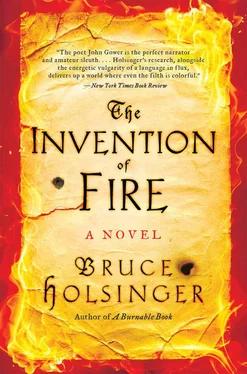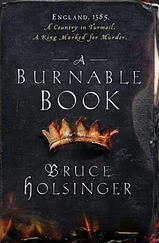Bruce Holsinger - The Invention of Fire
Здесь есть возможность читать онлайн «Bruce Holsinger - The Invention of Fire» — ознакомительный отрывок электронной книги совершенно бесплатно, а после прочтения отрывка купить полную версию. В некоторых случаях можно слушать аудио, скачать через торрент в формате fb2 и присутствует краткое содержание. Год выпуска: 2015, Издательство: HarperCollins, Жанр: Исторический детектив, на английском языке. Описание произведения, (предисловие) а так же отзывы посетителей доступны на портале библиотеки ЛибКат.
- Название:The Invention of Fire
- Автор:
- Издательство:HarperCollins
- Жанр:
- Год:2015
- ISBN:нет данных
- Рейтинг книги:3 / 5. Голосов: 1
-
Избранное:Добавить в избранное
- Отзывы:
-
Ваша оценка:
- 60
- 1
- 2
- 3
- 4
- 5
The Invention of Fire: краткое содержание, описание и аннотация
Предлагаем к чтению аннотацию, описание, краткое содержание или предисловие (зависит от того, что написал сам автор книги «The Invention of Fire»). Если вы не нашли необходимую информацию о книге — напишите в комментариях, мы постараемся отыскать её.
The Invention of Fire — читать онлайн ознакомительный отрывок
Ниже представлен текст книги, разбитый по страницам. Система сохранения места последней прочитанной страницы, позволяет с удобством читать онлайн бесплатно книгу «The Invention of Fire», без необходимости каждый раз заново искать на чём Вы остановились. Поставьте закладку, и сможете в любой момент перейти на страницу, на которой закончили чтение.
Интервал:
Закладка:
Though not this very hour, perhaps. “Tell me of your crimes, Robert,” she said into the dark.
His breath stopped. “My crimes?” he said from the floor.
“What put you in the Portbridge gaol?”
“That. Well.” He sniffed. “A hundred pigeons, a dozen hinds, a boar, a faun or two.”
“Yet you are a cook,” she said.
“I am.”
She propped herself up on an elbow. “Then by your station you are naturally accustomed to dealing in beasts and fowl for your lord. Why would such things put you in gaol?”
“I am a poacher, aren’t I. No problems stewing harts and peacocks from those given license to shoot ’em, like m’lord on his hunts. But shoot ’em myself, to coin off the meat and hide and feathers? A gallows stands at the end of that road. They rode me on a pillory wagon through half the villages of Kent before tossing me in the gaol at Portbridge. Would have been the king’s justice at Westminster but for the guns.”
“Was this your first arrest?”
He laughed softly. “Hardly. Was my tenth, eleventh. They’d finally had enough of Robert Faulk, that’s sure.”
She thought about this. A common criminal ravishing the hunting grounds of dukes and lords, likely going after the same hinds and boars pursued by her husband, though with much more skill and cunning. Yet in his work he was no better than a butcher. To Margery there seemed little difference between taking a hart in a royal wood and cutting up mutton in the kitchens. To put a man to death for the crime of killing a deer?
“In the woods,” she said.
“Yes.”
“You shot like a royal archer. It is why we are alive.”
“You are why I am alive.”
He had said it simply, instantly. She felt a rush of desire.
“You spared me, Dame Marg-”
“No.”
“You spared me, Margery. I saved you. There was no choice in the matter.”
Some minutes passed. From far off in the hills came a long and lonesome wail, followed by another. She moved her elbow and settled back into the pallet, listening to the plaintive song of the wolves.
“And your crimes, Elizabeth?” he asked softly.
She’d thought he was asleep. She considered her reply. “I am also a killer of beasts,” she eventually said. “Well . . . one beast.”
At dawn, as the low bell tolled from the small parish church down the road, she woke to find him staring at his feet in the rising light. He sat on the floor of their room as if frozen, his long body angled against the wall. At the inn’s waking bell, when companies on pilgrimage were to gather in the hall, he refused to come with her. She willed him to find the strength, urged him to rise. He would not move.
“You cannot remain in this room all day, Robert,” she pleaded.
She looked at him, willing that new confidence to return from wherever it had fled. He would not meet her eyes. She left him there, bent and afraid.
In the kitchen the keeper’s wife shredded greens. The curly leaves went in a heaping basket, the stalks in a pail for the hogs. On the long, narrow table dividing the room was a basket of pears, blushed a deep red. “May I take one, please?” she asked.
“Course, mistress,” said the wife, offering her the lot. She took one of the fruits. Softened with ripeness, the pear’s skin gave beneath her thumb, spreading a thimble’s worth of juice along her skin. She wiped it on her sleeve.
In their room she handed him the pear. Its light heft and perfect ripeness seemed to enliven him. From a pouch at his side he pulled a knife. He looked up at her from the floor, holding the fruit between them.
An offer. She nodded and sat.
First he cored it, plunged the big knife in from the bottom and drew forth the seeds and stem in a single movement. He set the core aside, a short length of stick, flesh, and clinging seeds. Then, more slowly, he separated the peel, curling it from the flesh in one long, delicate spiral. His fingers were quick like a child’s, nimble despite the size and strength of his hands. He palmed the quartered pear. She took a wedge. The sweet juice moistened her lips, dribbled to her chin. She moved to wipe it off with her sleeve but his hand had risen to the task, though he withdrew it before he touched her. She reached daringly for it, brought it to her face, moved his thumb across her chin, her lips, her nose. She kissed the pear juice from the rough pad, then pushed his hand back to his crossed ankles.
She returned to the common room to find the other women in their company already gathered around a table.
“And where is your man of sorrows, Mistress Elizabeth?” said Constance, nudging her sister’s arm.
“Swinking off his debt through Nocturns, I hope and expect,” Catherine chimed in.
Margery gave the sisters a coy smile, raised her brow slightly, let them think what they would. She joined them at the common table. The food was simple, a spiced rye gruel with cream in a trencher of heavy, dark bread. She sat and ate, hardly tasting the meal as the mixed companies held forth in subdued conversations around the front room.
Eventually the keeper came in to stand at the hearth and speak to his guests about their wishes for the day and night. The burial of the brigands’ victim would take place that afternoon in the parish churchyard, he said, with four shillingsworth for the parson and the sexton’s diggers. A cup was passed around, purses opened, bright clinks of pennies and groats. She put in a half noble, a gentlewoman’s share. After a brief consultation among the men, the decision was made in her own company to stay on in the village for a third night, out of respect for the widow and her son.
The keeper stepped down from the hearth and made way for a stooping, bashful man who had arrived at the inn with the smaller Canterbury group. He fidgeted and hawed for a few moments, then voiced his request. “We would like to join ourselves to your fellowship, good gentles, if you will have us. The road north to Durham is long and, as we have already known, perilous. We have a widow and her child among us. The pall of death hangs over our sacred purpose. Yet there is safety of body in higher numbers. Good fortune in newly joined hands. Will you have us?”
Their own company huddled and conferred in a corner. No one could find a strong reason to object to joining the second pilgrimage to their own. True, a larger company made for more difficulty in finding lodging-though they would be on main highways the entire journey, with many inns along the way. The presence of a child might complicate things-though who could deny this bereft boy and his grieving mother the gift of greater fellowship?
Margery listened silently. Saying something contrary would only arouse suspicions. The decision was made with little delay. Afterward the mood in the room lightened despite the coming burial, as the two companies mingled and met, swapped bits of their lives and stories, becoming one. They would be twenty now, a full and merry group for the still-lengthy journey to Durham.
She sat alone, weighted by the decision. They had hoped for a clear separation from the Canterbury group, assuming the other company would stay behind for the burial. Now it seemed inevitable that this widow would see Robert. Perhaps know him.
In their chamber she told him the news. His eyes grew wild, unfocused as he paced the floor. He glanced out past the shutters more than once, as if planning to flee.
She stood in his way. He looked down at her, his breaths coming quickly. She put her hands on his face, tangled her fingers in his thick beard, and made him look at her. “Sit just there,” she said, gesturing to a place along the wall. “Wait for me.” He sat.
Back to the kitchen, where she procured a basin of heated water from the keeper’s wife, who also slipped her a clump of wood lye mixed with honey-a soap we keep only for our gentle guests, she explained.
Читать дальшеИнтервал:
Закладка:
Похожие книги на «The Invention of Fire»
Представляем Вашему вниманию похожие книги на «The Invention of Fire» списком для выбора. Мы отобрали схожую по названию и смыслу литературу в надежде предоставить читателям больше вариантов отыскать новые, интересные, ещё непрочитанные произведения.
Обсуждение, отзывы о книге «The Invention of Fire» и просто собственные мнения читателей. Оставьте ваши комментарии, напишите, что Вы думаете о произведении, его смысле или главных героях. Укажите что конкретно понравилось, а что нет, и почему Вы так считаете.












